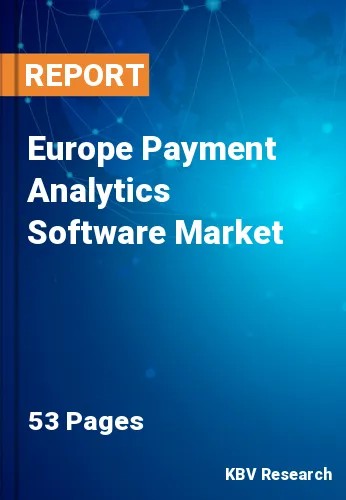The Europe Payment Analytics Software Market would witness market growth of 4.1% CAGR during the forecast period (2022-2028).
Transaction data is incredibly valuable, although it can be difficult to collect and analyze, particularly if companies work with many PSPs and receive separate data reports from each. Several market players give customers a single reporting source, allowing users to swiftly extract insights from data and apply them to their business choices. In general, transaction analytics aid in the optimization of payment processes and the reduction of internal expenses by focusing on customer requirements and developing more cost-effective methods to suit those demands. Rather than making selections based on gut instinct, transaction analytics might reveal inefficient regions that require to be improved or areas that need less expenditure.
Because security is a major concern for any firm which accepts payments, more money is being invested in this area. Each business would desire to safeguard its consumers and the company itself against online fraud from an ethical standpoint. Furthermore, firms must adhere to stringent rules, such as the PSD2 legislation.
A significant proportion of German import transactions, particularly those engaging large German wholesalers, are conducted under seller-buyer terms, like the standard 30/60/90-day accounts or payment against documents. Electronic funds transfer (EFT, also known as SWIFT or wire transfers) is the most common payment method used by German importers to pay their American suppliers, and it is also the quickest and most inexpensive. Online transfers are now quite secure and transparent due to current technology.
The letter of credit has been used in certain industries, but it only accounts for a small percentage of total imports, owing to its high cost and time constraints, as well as the simplicity with which credit ratings may be obtained in Germany, increasing transparency and transactional safety. In Germany, L/Cs for payments under USD 5,000 are nearly unheard of. Germany has the second-largest FinTech market in Europe and the fourth-largest in the world. On average, the FinTech sector increased dramatically between 2015 and 2019. With over 64 percent of digital end users utilizing FinTech services in 2019, Germany's FinTech adoption rate equaled that of the rest of the world 2019.
These results put Germany ahead of the global and European averages, putting it Europe's second-most attractive FinTech market after the United Kingdom. Owing to these huge amounts of payment transactions and the high adoption rate of payment solutions by companies, the growth of regional payment analytics software would expand in the coming years.
The Germany market dominated the Europe Payment Analytics Software Market by Country in 2021, and would continue to be a dominant market till 2028; thereby, achieving a market value of $259.3 million by 2028. The UK market is estimated to grow at a CAGR of 3.2% during (2022 - 2028). Additionally, The France market would witness a CAGR of 4.8% during (2022 - 2028).
Based on Type the market is segmented into Web Based and Cloud Based. Based on Enterprise Size, the market is segmented into Large Enterprises and Small & Medium Enterprises. Based on countries, the market is segmented into Germany, UK, France, Russia, Spain, Italy, and Rest of Europe.
Free Valuable Insights: The Global Payment Analytics Software Market will Hit $3.9 Billion by 2028, at a CAGR of 4.5%
The market research report covers the analysis of key stake holders of the market. Key companies profiled in the report include Adobe, Inc. (X.commerce), BlueSnap Corporate, Databox, Inc, Payfirma, Yapstone, HiPay, ProfitWell (Paddle), and CashNotify (Baguette Engineering).
By Type
By Enterprise Size
By Country
Our team of dedicated experts can provide you with attractive expansion opportunities for your business.

